Reports and Issue Briefs
APHA highlights the latest research to develop reports and issue briefs on critical public health issues such as environmental health, health equity, and violence and injury prevention.
CLIMATE CHANGE
Climate change is any change in average weather that lasts for a long period of time. Climate change can affect public health by harming the water supply, increasing vector-borne disease and increasing extreme weather events.
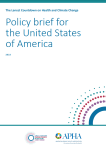 2023 Lancet Countdown on Health and Climate Change: Brief for the United States of America (PDF) presents country-level data on the health impacts of climate change from the 2023 Global Lancet Countdown Report. Building on this evidence, it recommends opportunities for advancing health and equity through climate action.
2023 Lancet Countdown on Health and Climate Change: Brief for the United States of America (PDF) presents country-level data on the health impacts of climate change from the 2023 Global Lancet Countdown Report. Building on this evidence, it recommends opportunities for advancing health and equity through climate action.
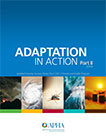 Adaptation in Action, Part 2: Updated Grantee Success Stories from CDC's Climate and Health Program (PDF) highlights such accomplishments as disease burden assessments in Illinois, New Hampshire and New York, vulnerability mapping in Massachusetts and North Carolina, development of a climate change and healthy homes curriculum in Maryland, local climate and health interventions in Oregon and climate and health education projects and tools in Rhode Island and Wisconsin.
Adaptation in Action, Part 2: Updated Grantee Success Stories from CDC's Climate and Health Program (PDF) highlights such accomplishments as disease burden assessments in Illinois, New Hampshire and New York, vulnerability mapping in Massachusetts and North Carolina, development of a climate change and healthy homes curriculum in Maryland, local climate and health interventions in Oregon and climate and health education projects and tools in Rhode Island and Wisconsin.
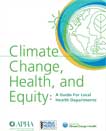
Climate Change, Health and Equity: A Guide for Local Health Departments (PDF) is a comprehensive resource to help local public health departments integrate climate change and health equity into practice. Download higher resolution guide chapters on our Climate Change, Health and Equity page.
COMMUNITY DRIVERS OF HEALTH
Building on discussions between public health and health care experts assembled by APHA, AcademyHealth and Kaiser Permanente, a new set of policy papers addresses three key social determinants of health: food security, housing and transportation.
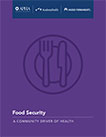 Food Security: A Community Driver of Health (PDF) underscores how the lack of access to affordable and healthy foods is an enduring
problem that the coronavirus pandemic turned into a national emergency.
Food Security: A Community Driver of Health (PDF) underscores how the lack of access to affordable and healthy foods is an enduring
problem that the coronavirus pandemic turned into a national emergency.
Improving food security depends on prioritizing low-income communities and communities of color. Policies to improve access to support healthy eating patterns highlighted in the paper include healthy food financing initiatives.
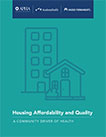 Housing Affordability and Quality: A Community Driver of Health (PDF) highlights many approaches that can increase housing stability, support healthier home environments, improve health, and increase health equity.
Housing Affordability and Quality: A Community Driver of Health (PDF) highlights many approaches that can increase housing stability, support healthier home environments, improve health, and increase health equity.
Potential solutions described in the policy paper include tax credits and rental assistance, community land trusts, fair lending practices, smoke-free multi-unit housing and housing repair support.
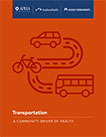 Transportation: A Community Driver of Health (PDF) explains how transportation decisions affect everyone, by influencing where they live, how they can get to work and school, whether they can easily access health and other essential services, how they socialize with family members and friends, and ultimately if they can thrive in a physical environment that supports healthy outcomes.
Transportation: A Community Driver of Health (PDF) explains how transportation decisions affect everyone, by influencing where they live, how they can get to work and school, whether they can easily access health and other essential services, how they socialize with family members and friends, and ultimately if they can thrive in a physical environment that supports healthy outcomes.
Some potential strategies and action steps include focusing on community design, street design and land use policies that make it easier for people to access physical activity, jobs and other essential services, and on the engagement of stakeholders in planning decisions.
ENVIRONMENTAL HEALTH
Environmental Health is the branch of public health that: focuses on the relationships between people and the environment; promotes human health and well-being; and fosters healthy and safe communities.
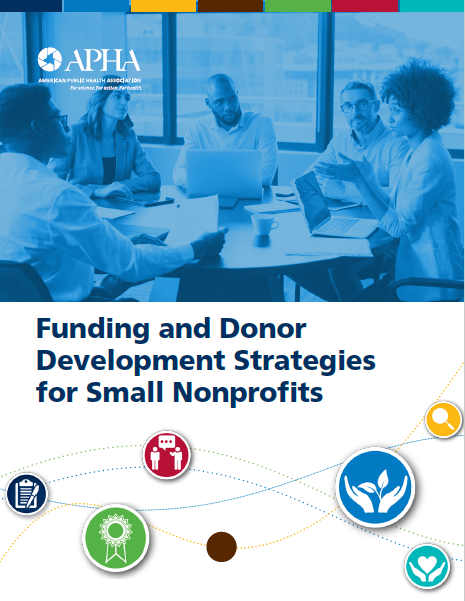 Funding and Donor Development Strategies for Small Nonprofits (PDF) provides an overview of the strategies, insights and best practices for funding and donor development and includes additional insights for organizations specifically working in the environmental justice space (2023).
Funding and Donor Development Strategies for Small Nonprofits (PDF) provides an overview of the strategies, insights and best practices for funding and donor development and includes additional insights for organizations specifically working in the environmental justice space (2023).
Communications Strategies for Social Justice (PDF) offers best practices and sample communications that can be used by any organization working towards social justice (2022).
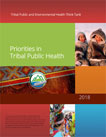
Tribal Priorities in Public Health (PDF) recognizes the environmental injustices and lack of health equity that impact Indian Country and calls for action to remedy the deeply rooted causes of poor health to achieve a healthier future (2018).
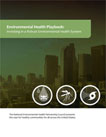
The Environmental Health Playbook (PDF) provides case examples that show the need for a strong and equitable system and standard approaches that ensure environmental health equity, protections and access for all — particularly vulnerable and at-risk populations. (2017)

Partnering with Metropolitan Planning Organizations to Advance Health (PDF) outlines the core responsibilities of a Metropolitan Planning Organization and how public health practitioners can collaborate with them to advance healthy communities. (2017)
HEALTH EQUITY
Creating health equity is a guiding priority of APHA. By health equity, we mean everyone has the opportunity to attain their highest level of health.
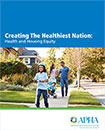 Creating the Healthiest Nation: Health & Housing Equity. (PDF) examines how structural racism and discriminatory policies led to housing and health inequality in America for low income communities and people of color. To equip public health professionals with the tools to address these inequities in their communities, the report ends by outlining numerous ways to advance equitable change in housing equity through policy and advocacy, cross-sector partnerships and community engagement and education. (2020)
Creating the Healthiest Nation: Health & Housing Equity. (PDF) examines how structural racism and discriminatory policies led to housing and health inequality in America for low income communities and people of color. To equip public health professionals with the tools to address these inequities in their communities, the report ends by outlining numerous ways to advance equitable change in housing equity through policy and advocacy, cross-sector partnerships and community engagement and education. (2020)

All Health is Connected: Can Leveraging Women's Health Care Help Narrow Gaps in Black Men's Health. (PDF)explores how preconception and pregnancy-related care can help underserved black men find a medical home of their own. (2018)
SCHOOL HEALTH AND EDUCATION
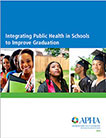 Integrating Public Health in Schools to Improve Graduation chronicles the journey of APHA’s Center for School, Health and Education to discover a new path to address school dropout with schools and their communities. The report’s findings and recommendations focus on the urgent need to reduce social inequities that derail health and educational success for the students most at risk of not graduating.
Integrating Public Health in Schools to Improve Graduation chronicles the journey of APHA’s Center for School, Health and Education to discover a new path to address school dropout with schools and their communities. The report’s findings and recommendations focus on the urgent need to reduce social inequities that derail health and educational success for the students most at risk of not graduating.
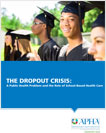
The Dropout Crisis: A Public Health Problem and the Role of School-Based Health Care (PDF) unpacks the societal cost of school dropout and identifies school-based, public health prevention strategies. (2018)
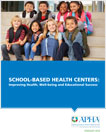
School-Based Health Centers: Improving Health, Well-Being and Educational Success (PDF) explores the most common barriers to high school graduation and discusses opportunities for school-based health centers and their partners to address those barriers at the school-wide population level. (2018)
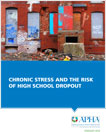
Chronic Stress and the Risk of High School Dropout (PDF) describes the causes and impacts of chronic stress, the implications for health and education professionals and recommendations for improving student outcomes. (2018)
OTHER
 Assessment of Key Constitutional, Health and Public Policy Positions, Honorable Brett M. Kavanaugh, Associate Justice Nominee, U.S. Supreme Court (PDF) highlights Kavanaugh's position on such issues as the Affordable Care Act, Clean Air Act protections, reproductive health care and gun violence prevention. APHA also sent a letter to senators regarding Kavanaugh's record.
Assessment of Key Constitutional, Health and Public Policy Positions, Honorable Brett M. Kavanaugh, Associate Justice Nominee, U.S. Supreme Court (PDF) highlights Kavanaugh's position on such issues as the Affordable Care Act, Clean Air Act protections, reproductive health care and gun violence prevention. APHA also sent a letter to senators regarding Kavanaugh's record.
 Strong, lasting change happens when health departments and communities work side-by-side. The new Build and Bridge Library was created to support that work by bringing together practical tools, strategies, and examples that help community-based organizations and cross-sector allies collaborate more effectively. It’s a space to learn, get inspired and find approaches that can be adapted to fit local needs.
Strong, lasting change happens when health departments and communities work side-by-side. The new Build and Bridge Library was created to support that work by bringing together practical tools, strategies, and examples that help community-based organizations and cross-sector allies collaborate more effectively. It’s a space to learn, get inspired and find approaches that can be adapted to fit local needs.
